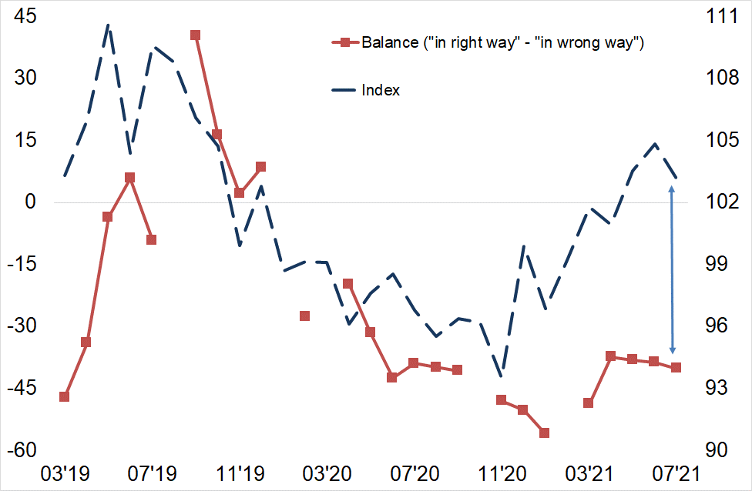Significant economic complications and the introduction of anti-coronavirus restrictions, which have already been going on for a year and a half, have understandably (precipitated) a deterioration of the socio-economic situation in Ukraine. Meanwhile, Ukraine once again has managed to avoid (this time, a coronavirus) collapse. Moreover, even in the context of “delayed” vaccination, a number of indicators provide positive signals for some improvement in the economic situation of households.
One of the indicators of well-being in Ukraine can be the Economic Capacity Index of population (Index), which was developed and implemented by the Razumkov Centre. The Index is based on objective (statistical) indicators and characterizes (integrates) not only the traditionally considered purchasing power of population (including salaries and their arrears, current price and exchange rate dynamics), but also economic stability — the ability of the "average" household to survive in the event of loss of sources of current income over a period of time (in particular, through access to deposit and credit resources, funds received from abroad, etc.). Economic stability is one of the most important conditions for a sense of security in life, confidence in future — hence, the ability to build long-term life strategies, which is also a condition for positive social well-being.
Despite the continuation of coronavirus complications, during the spring-summer period of this year, this Index shows a fairly steady upward trend, which is interpreted as an improvement in the economic condition of households. However, are there real grounds for such a rather optimistic assumption? (Here we will not discuss the reliability of official statistics, as we still do not have an alternative system source.)
Since the beginning of the year, wages have shown accelerated growth — in March, the average salary exceeded $ 500 (in nominal terms), and in June-July reached a historic high of $ 530. At the same time, the real average salary has increased by 10% since the beginning of the year. It should be noted that wage growth was not due to purposeful government policy, but the willingness of employers to develop business (even under fiscal pressure), as well as to retain skilled workers.
Evidence of higher incomes was the growth in household deposits, which increased by UAH 17 billion since the beginning of the year. The rapidly growing amount of money that Ukrainians receive from abroad in the form of transfers has also resumed. Thus, if in January-February the average monthly "net" resources from abroad (the difference between received and made transfers) through private transfers amounted to about $ 300 million, in June-July they reached $ 450 million.
At the same time, the spring-summer period is characterized by the constancy of housing and communal tariffs and even the absence of payment for heating (which in winter is the lion's share of payments), which significantly increases the amount of "free" resources in households, and thus their current purchasing and payment ability.
However, along with the economic measurement of household resources, the "well-being" of Ukrainians is reflected in surveys conducted by the Razumkov Centre. The role of an important indicator of well-being is played by the question "… are events in Ukraine developing in the right or wrong direction?". The result, as the difference between positive and negative assessments, can serve as a socio-psychological indicator of the correctness of the movement of the country.
Of course, a significant (and in some periods even decisive) role in the psychological perception of the "correctness" of the situation in the country is played by the current economic situation and economic stability of households. Therefore, the dynamics of well-being may well be correlated with the dynamics of economic indicators. Indeed, throughout 2020, in conditions of significant deterioration of welfare, which was also influenced by the failed anti-coronavirus policy, there was a "synchronised" decline in the Index and values of well-being, which at the end of 2020 — beginning of 2021 fell to minimum levels (chart "Correctness of the movement of the country and the Economic Capacity Index").
Correctness of the movement of the country (left scale) and the Economic Capacity Index (right scale)

The situation started to be significantly different in the spring of 2021. If, as indicated, the Economic Capacity Index began to show a clear upward trend, the results of the polls indicated a resumption of frustration (and even irritation) of Ukrainians in activities of the government. Thus, in this period (April-July) there is a growing "gap" in the dynamics of the Index and the correctness of the movement of the country: certain economic improvement no longer "compensates" for losses, omissions, shortcomings in other social and humanitarian spheres (which increasingly concern Ukrainians), and thus socio-political factors and components increase their significance.
The growth of this gap (similar to the one in early 2019), at the same time, is evidence of growing public dissatisfaction with government actions. And if one remembers that in autumn the social and housing and communal spheres are preparing additional "surprises" for Ukrainians, the probability of open dissatisfaction seems high.




